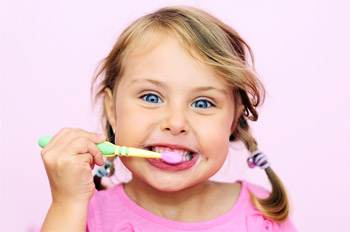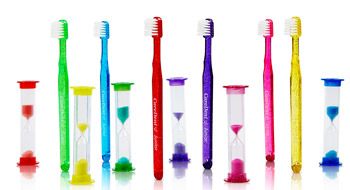Dr Philippa Sawyer Half of Kids Under Six Suffering From Tooth Decay Interview

Dr Philippa Sawyer Half of Kids Under Six Suffering From Tooth Decay Interview
With fifty per cent of children under six suffering from tooth decay, ensuring children brush their teeth correctly from a young age is vital. Tooth decay is Australia's most prevalent health problem yet is completely preventable and treatable with good dental hygiene and good food habits which are formed in our early years. Children should brush their teeth as soon as they show, but will initially need help as baby teeth usually appear at around six months.
'Tooth decay occurs faster in children than in adults and children are often more prone to tooth decay in part due to over consumption of sugary foods and drinks," explained Paediatric Dentist, Dr Philippa Sawyer. 'Bacteria in the mouth convert sugars into acids which eat away at the surface of the tooth, causing wear and decay in the form of holes and cavities. If left untreated, decaying teeth cause pain and make it difficult to chew. It's really important to instil good oral hygiene habits in children from a young age so these good habits are carried through into adulthood, otherwise issues like tooth decay can become a serious problem," added Dr Sawyer.
'By injecting some fun into teeth brushing time, kids are in a good position to learn life-long good dental hygiene habits. Kids are more motivated by fun than by health or habit. By making teeth brushing time more of an experience, your child won't see it as a chore anymore and can learn good dental care."
Here, Dr Sawyer outlines some top dental care tips for teaching kids good oral hygiene.
Have a teeth brushing routine
It's important for kids to get into a routine of brushing their teeth twice daily, and the best way to learn this habit is to teach by example. Brushing reduces the risk of decaying teeth by 25 percent. It's also important that they learn to brush their teeth the same way every day, so that no tooth is missed. Start with their back teeth on the right hand side and work around to the left side. Brushing at the same time every day will also help create a routine. Make brushing teeth a game by asking your kids to show you their best crocodile jaw or lion roar to encourage a wide open mouth.
Brush for the recommended time
Another fantastic habit to build is teaching kids to brush their teeth for a minimum of two minutes. Start by playing their favourite song and encourage them to brush their top teeth for one minute and then the bottom for one minute with a different song. Alternatively, choose a toothbrush with a light up timer to help add some fun. This will ensure that they will reach every tooth.
Choose the right toothbrush
As kid's teeth and gums can still be a little sensitive, choose a soft bristled toothbrush and try pick one in their favourite colour. Soft bristles remove plaque and debris from the mouth very effectively. If the bristles are still a little too firm, soaking it in warm water for a few minutes will do the trick.
Use the right amount of toothpaste
From the age of three, kids can graduate from using a grain of rice sized amount of toothpaste to a pea-sized amount. If kids are brushing correctly in a circular motion at a 45 degree angle, as well as inside, outside and in between their teeth, a pea-sized amount of tooth-paste will foam enough to cover all teeth.
Refrain from offering kids sugary foods and drinks
Tooth decay is the second most costly diet related disease in Australia, according to the Australian Dental Association. We know that kids love sweet drinks, but make sure they don't have any sugary drinks right before bed or a nap, particularly if they have just brushed their teeth. This will help with limiting the damage caused by sugar to the teeth and gums as well as encouraging better oral hygiene. Eating calcium rich foods such as milk, cheese and yoghurt, neutralise the damage caused by acid in the mouth.
For more information on kids oral care products and oral health kits, please contact CareDent on 1800 800 303 or visit www.cardent.com.au.
Interview with Paediatric Dentist, Dr Philippa Sawyer
Question: Are you surprised that fifty per cent of children under six suffering from tooth decay?
Dr Philippa Sawyer: It isn't much of a surprise that children suffer from tooth decay- with the whole process of teeth brushing seen as a chore. Many children are also being exposed to poor diets and sugary drinks from an early age which all contributes to tooth decay.
 Question: To what extreme is this tooth decay?
Question: To what extreme is this tooth decay?
Dr Philippa Sawyer: Tooth decay cases differ in each person- the longer tooth decay is left untreated, the more damage caused. Decaying teeth cause pain and make it difficult to chew.
Question: How can we prevent tooth decay in children?
Dr Philippa Sawyer: Tooth decay is Australia's most prevalent health problem yet is completely preventable and treatable with good dental hygiene and good food habits which are formed in our early years. Brushing reduces the risk of decaying teeth by 25 percent.
Question: How should young children be brushing their teeth?
Dr Philippa Sawyer: Children should brush their teeth as soon as they show, but will initially need help as baby teeth usually appear at around six months. It's important that they learn to brush their teeth the same way every day, so that no tooth is missed. Start with their back teeth on the right hand side and work around to the left side. Brushing at the same time every day will also help create a routine.
Question: How can we make brushing teeth fun for kids?
Dr Philippa Sawyer: Make brushing teeth a game by asking your kids to show you their best crocodile jaw or lion roar to encourage a wide open mouth.
Choose a toothbrush with a light up timer to help add some fun, or play their favourite song for 2 minutes.
As kid's teeth and gums can still be a little sensitive, choose a soft bristled toothbrush and try pick one in their favourite colour.
Question: How often should kids be seeing their dentist?
Dr Philippa Sawyer: Regular visits ot the dentist are appointment. AS a rule of thumb, twice yearly visits for children are best, although some children may be able to go once a year, depending on oral health.
Question: Why does tooth decay occur faster in children than in adults?
Dr Philippa Sawyer: Tooth decay occurs faster in children than in adults and children are often more prone to tooth decay in part due to over consumption of sugary foods and drinks
Question: Should children be ensuring they don't swallow toothpaste?
Dr Philippa Sawyer: When a child swallows toothpaste, it contains a high concentration of fluoride which enters the blood stream, adversely affecting the development of teeth.
Question: What do sugary drinks, do to our teeth?
Dr Philippa Sawyer: Bacteria in the mouth convert sugars into acids which eat away at the surface of the tooth, causing wear and decay in the form of holes and cavities.
Question: How can we prevent damage to our teeth from soft drinks?
Dr Philippa Sawyer: Eating calcium rich foods such as milk, cheese and yoghurt, neutralise the damage caused by acid in the mouth. However, the best thing to do is to stay away for soft drinks!
Interview by Brooke Hunter
MORE



